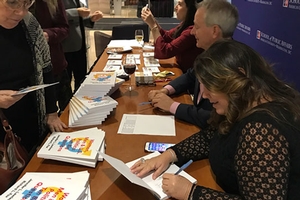Research
Ten Big Questions about Women, Men, and U.S. Politics

American University School of Public Affairs Professor Jennifer Lawless introduced her new book, "Women, Men & U.S. Politics: Ten Big Questions," at a recent interactive event in downtown Washington, D.C., where experts shared their take on issues ranging from wage disparity to the electability of women.
"We want to shed light on some of the questions that we think affect female candidates, women as voters, women as donors, and the public policies that are most likely to affect women," said Lawless, who is the director of the Women & Politics Institute at AU. Her book, coauthored by Richard L. Fox of Loyola Marymount University, was published in August by W. W. Norton & Company.
Similar to speed dating, the evening provided a chance to meet several notable people as participants rotated among 10 different stations. At each table, a speaker had a question that correlated with a chapter in the book to discuss. Lawless kicked off the event by explaining the concept and sending participants to their assigned tables.
At the first station was Jennifer Palmieri, an AU School of Public Affairs alumna and former director of communications for Hillary Clinton's 2016 presidential campaign.
"So, the question is, 'Is feminism dead?' I don't think that it is," she said. Palmieri described her behind-the-scenes take on the election and her hope that future women pursue office.
"Women may bring leadership qualities that men don't to the job, and those can be qualities that we really need now," she said. "The world is very interconnected. Cooperation could go a long way."
The seventh station was staffed by SPA Executive-in-Residence Capri Cafaro, a former Democratic member of the Ohio State Senate, who talked about whether men and women govern differently. She said the conversations were an opportunity to encourage and empower women to recognize their leadership potential.
"Leadership means compromise. So often now, compromise is a dirty word and seen as a weakness," said Cafaro. "I think it's a strength for men and women to find compromise, to bring our views together and have civil dialog toward a greater good."
Lawless said the goal of the event was to give participants snippets of information and inspire them.
"The experts at each table were outstanding, and the participants asked provocative questions too," said Lawless. "I'm heartened that people care that much about the topic."
